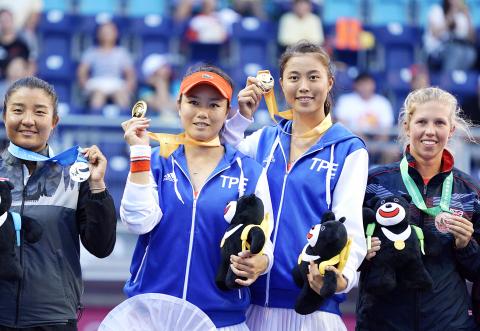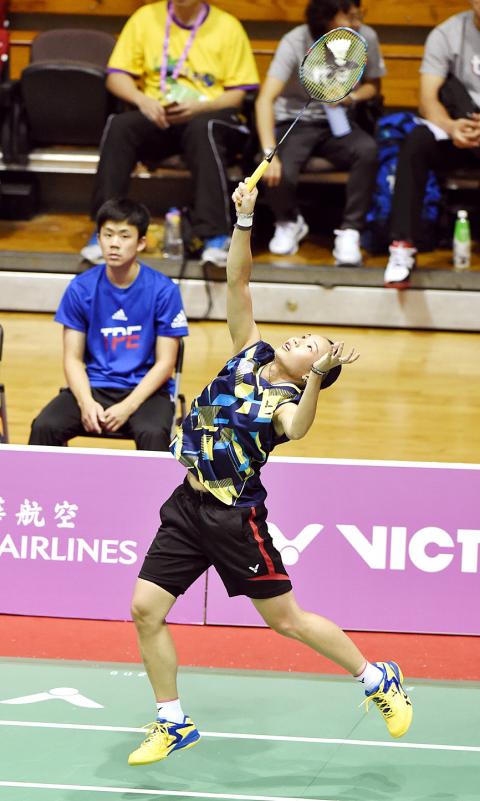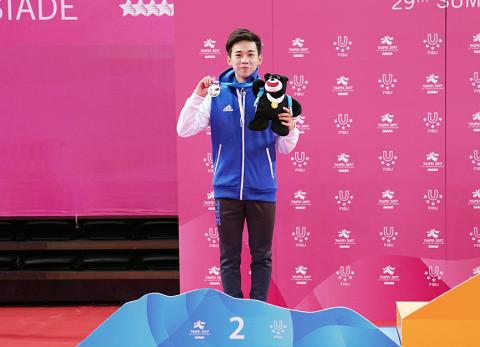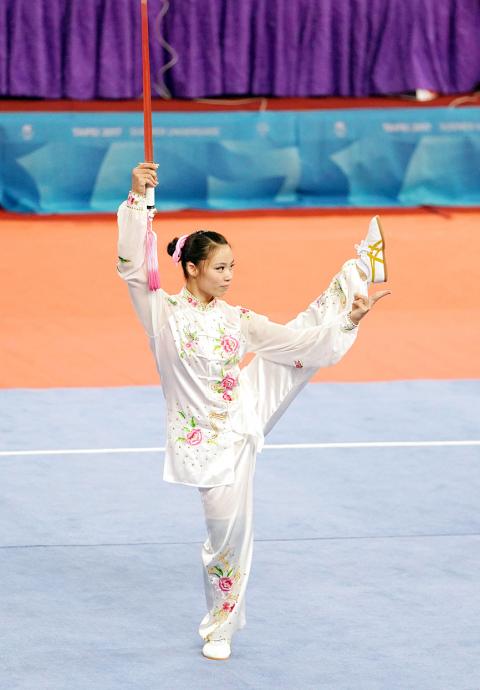A minor case of heat stroke yesterday did not deter Chan Jung-jan (詹詠然) as she and her sister Chan Hao-ching (詹皓晴) won a much-anticipated gold medal in women’s doubles, beating Thai opponents Varatchaya and Varunya Wongteanchai in two straight sets.
The Chan sisters took the first set 6-1 in less than one hour, breaking their opponents’ serves in the fourth and sixth games.
However, Chan Jung-jan called for medical treatment during the break between the first and second sets, and medical staff sought to reduce her body temperature.

Photo: CNA
Despite an apparent decline in strength, Chan Jung-jan and her sister worked together to break the Thai sisters’ serves in the second game of the second set.
Though both kept their serves after the second game, the Wongteanchais’ relentless attack and defense paid off when they broke the Chans’ serve in the eighth game and kept their own serve at the ninth game, to take a 5-4 lead.
However, the Taiwanese pair proved unstoppable as they kept their own serve at the 10th game and broke their opponents’ serve in the 11th, giving them a 6-5 lead.

Photo: Fang Pin-chao, Taipei Times
Chan Jung-jan’s powerful return at the net took the lead to 7-5 and won the Chans the gold.
Chang Kai-chen’s (張凱貞) hope of defending her Universiade singles gold medal title had been thwarted in the morning when she lost to Varatchaya Wongteanchai in straight sets in the semi-final.
She lost the first set 2-6 following a series of unforced errors and two broken serves. Though she broke Wongteanchai’s serve twice in the second set and forced a tie break, Chang appeared to run out of steam to finish 6-7 (3-7).

Photo: CNA
She said afterward that strained abdominal muscles and the diarrhea she has been suffering over the past few days had affected her performance.
However, Taiwan will still be represented in the women’s singles tennis final, as Lee Ya-hsuan (李亞軒) beat Thai Patcharin Cheapchandej 6-3, 4-6, 6-2 to secure a spot. Lee is scheduled to face Varatchaya Wongteanchai in the women’s singles finals today.
As there is no bronze medalist match in the women’s singles, Chang and Patcharin are both going home with bronze medals.

Photo: CNA
Meanwhile, Jason Jung (莊吉生) moved one step closer to his goal of clinching a gold in his first Universiade game after defeating Portugal’s Nuno Borges in the men’s tennis singles semi-final in two straight sets, 6-3, 6-3.
He will face South Korean Hong Seongchan in the final.
Chan Jung-jan was scheduled to join Hsieh Cheng-peng (謝政鵬) in competing in the mixed doubles semi-final match, but was forced to retire due to physical reasons.
In badminton, world No. 1 Tai Tzu-ying (戴資穎) defeated Belgian Lianne Tan 2-1 to advance to the semi-finals in the women’s singles.
Taiwanese Chiang Mei-hui (江美惠) also secured a semi-final spot after crushing her South Korean opponent in two straight games, 21-13, 21-6.
Wang Tzu-wei (王子維), the only Taiwanese left in the men’s singles, beat French Lucas Florent Claerbout in three games, 21-12, 19-21, 21-12.
Wang Chi-ling (王齊麟) and Lee Chia-hsin (李佳馨) and Lee Yang (李洋) and Hsu Ya-ching (許雅晴) were the remaining pairs who fought their way into the semi-finals for the mixed doubles.
The pairs of Lee Yang and Lee Jhe-huei (李哲輝) and Hsu Ya-ching and Wu Ti-jung (吳玓蓉) advanced to the semi-finals for men’s and women’s doubles respectively.
In table tennis, world No. 8 Cheng I-ching (鄭怡靜) beat Romanian Irina Ciobanu in the women’s singles quarter-final match in four games to advance.
Chen Chien-an (陳建安) is also headed to the semi-final after defeating South Korean Lin Jong-hoon 4-3.
As of press time last night, Chen Chien-an and Chiang Hung-chieh (江宏傑), Lee Chia-sheng (李佳陞) and Liao Cheng-tin (廖振珽) had yet to finish their respective semi-final matches.
Meanwhile, Taiwanese wushu athlete Chen Yu-wei (陳宥崴) won a silver medal in the men’s taolu.
China’s Kong Fanhui (孔繁輝) won the gold with a score of 19.33 and Malaysia’s Loh Choon How the bronze.
Taiwan’s Chen Yi-ying (陳宜盈) won silver in women’s taolu.
Taiwan’s rhythmic gymnastics team finished their group competition with a silver medal.
Additional reporting by CNA

CHAOS: Iranians took to the streets playing celebratory music after reports of Khamenei’s death on Saturday, while mourners also gathered in Tehran yesterday Iranian Supreme Leader Ayatollah Ali Khamenei was killed in a major attack on Iran launched by Israel and the US, throwing the future of the Islamic republic into doubt and raising the risk of regional instability. Iranian state television and the state-run IRNA news agency announced the 86-year-old’s death early yesterday. US President Donald Trump said it gave Iranians their “greatest chance” to “take back” their country. The announcements came after a joint US and Israeli aerial bombardment that targeted Iranian military and governmental sites. Trump said the “heavy and pinpoint bombing” would continue through the week or as long

TRUST: The KMT said it respected the US’ timing and considerations, and hoped it would continue to honor its commitments to helping Taiwan bolster its defenses and deterrence US President Donald Trump is delaying a multibillion-dollar arms sale to Taiwan to ensure his visit to Beijing is successful, a New York Times report said. The weapons sales package has stalled in the US Department of State, the report said, citing US officials it did not identify. The White House has told agencies not to push forward ahead of Trump’s meeting with Chinese President Xi Jinping (習近平), it said. The two last month held a phone call to discuss trade and geopolitical flashpoints ahead of the summit. Xi raised the Taiwan issue and urged the US to handle arms sales to

State-run CPC Corp, Taiwan (CPC, 台灣中油) yesterday said that it had confirmed on Saturday night with its liquefied natural gas (LNG) and crude oil suppliers that shipments are proceeding as scheduled and that domestic supplies remain unaffected. The CPC yesterday announced the gasoline and diesel prices will rise by NT$0.2 and NT$0.4 per liter, respectively, starting Monday, citing Middle East tensions and blizzards in the eastern United States. CPC also iterated it has been reducing the proportion of crude oil imports from the Middle East and diversifying its supply sources in the past few years in response to geopolitical risks, expanding

Pro-democracy media tycoon Jimmy Lai’s (黎智英) fraud conviction and prison sentence were yesterday overturned by a Hong Kong court, in a surprise legal decision that comes soon after Lai was jailed for 20 years on a separate national security charge. Judges Jeremy Poon (潘兆初), Anthea Pang (彭寶琴) and Derek Pang (彭偉昌) said in the judgement that they allowed the appeal from Lai, and another defendant in the case, to proceed, as a lower court judge had “erred.” “The Court of Appeal gave them leave to appeal against their conviction, allowed their appeals, quashed the convictions and set aside the sentences,” the judges